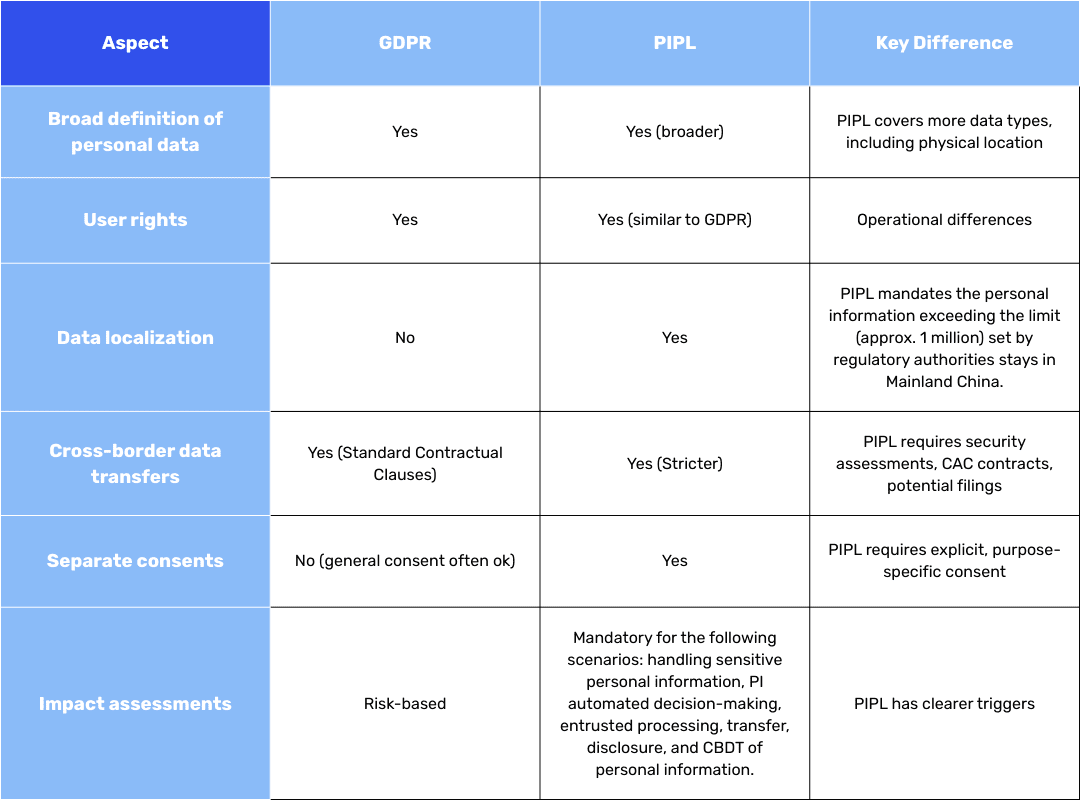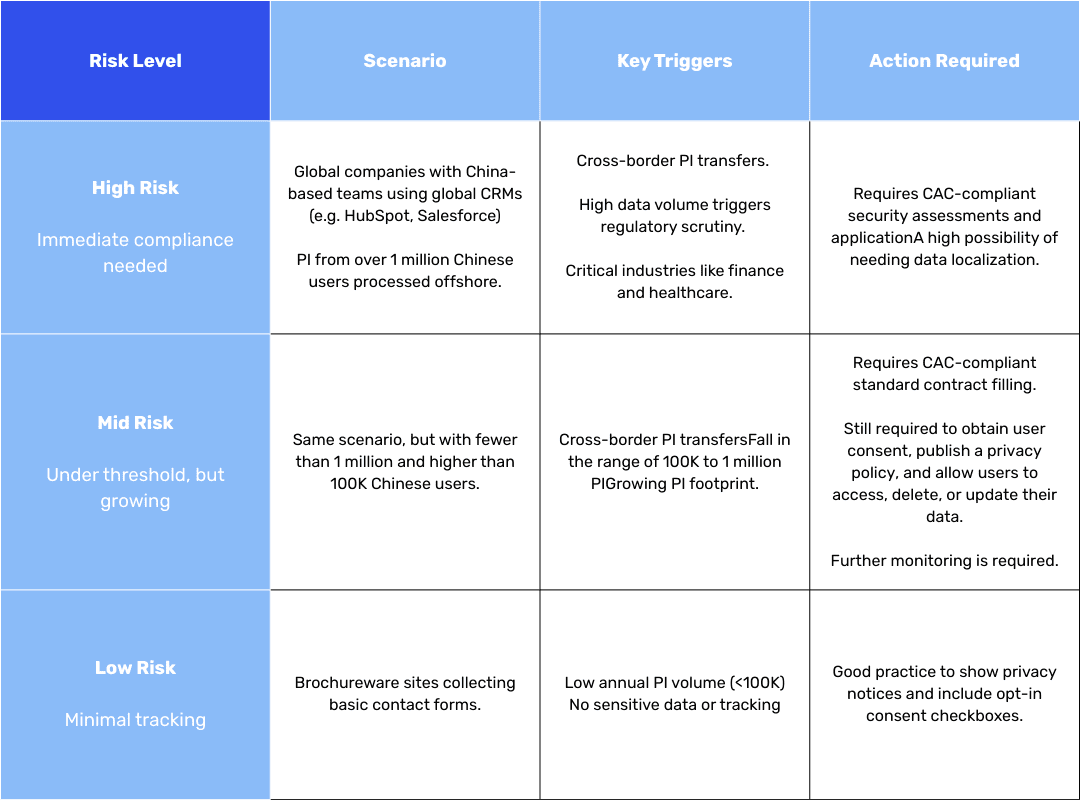1 - Expected post-Chinafy results
Navigating the China Personal Information Protection Law (PIPL): What You Need to Know
TL;DR If your website collects personal information from China, PIPL (Personal Information Protection Law) applies, even if your hosting is outside China.
- Targeting Chinese leads? You need explicit consent.
- Transferring data overseas? Expect stricter rules than GDPR.
- Slow site in China? Not a PIPL issue but a missed opportunity (that Chinafy can help with).
In this article, Chinafy’s partner, Lianwei Pancloud, will guide you through PIPL’s requirements.
Note: The information below is provided by Lianwei Pancloud, Chinafy’s compliance partner. The article is based on the available sources and aims to accurately represent Lianwei Pancloud's expertise and industry standing.
Does this scenario sound familiar?
You’re a global business growing in Mainland China. Leads pour in from webinars, WeChat campaigns, and trade shows. Sales agents collect local contacts and personal details sent straight to your global CRM hosted outside Mainland China.
Business is good, that is until compliance questions land on your desk.
What is PIPL? Why should you care?
PIPL is similar to the EU's GDPR, but with stricter rules including but not limited to:
A broader data scope which includes location data, biometrics, and more.
Data localization: Do you handle the personal information of over 1 million individuals from China? That volume is likely to raise flags with Chinese regulators, and trigger requirements to store and process that data within Mainland China.
Cross-border hurdles: Requires government-backed contracts and CAC filings where applicable.
Even if your entity is not based in Mainland China, targeting Mainland China may make you liable.
What is the CAC? The Cyberspace Administration of China (CAC) is China’s top internet regulator.
If we’re GDPR-compliant, are we covered?
Not quite. Here’s where many companies get caught.
If you’re processing approx. 1 million personal information of Chinese citizens, PIPL says it shall stay in Mainland China. However, in the realm of GDPR, there is no such rule.
PIPL also requires companies to sign government-standard contracts with offshore data recipients (i.e., your CRM or data owner). GDPR’s Standard Contractual Clauses are easier by comparison.
Here's a summary of the key difference between GDPR and PIPL.

GDPR vs. PIPL
More about PIPL vs GDPR
Does PIPL apply if my website is hosted outside of Mainland China?
Short answer? Yes.
PIPL was designed with extraterritorial reach, meaning it applies to any company — anywhere — that targets or serves users in China.
That includes websites collecting leads, contact forms capturing distributor details, or sales reps feeding customer info into your global CRM.
What does that mean in practice? You’re expected to:
Get explicit consent before collecting any personal data
Explain clearly what you’re collecting, why, and how it’ll be used
Protect that data with proper security controls
Follow cross-border transfer rules, which could mean security assessments or filings with Chinese regulators
Our website is slow in Mainland China — is this a compliance issue?
Unlikely. A slow site in China typically points to infrastructure issues, not a direct PIPL compliance problem.
But here’s the kicker: A slow site kills trust. Especially when you’re asking for personal information.
Many global websites slow to a crawl in Mainland China because they’re hosted offshore, using third-party resources blocked or throttled by latency issues in cross-border data delivery. And when users hesitate, conversions drop.
That’s where Chinafy comes in.
Chinafy is uniquely able to optimize the websites of companies whether they are hosted on or offshore.
Two scenarios of some of our users include:
Host offshore, outside of Mainland China with leads sent from Mainland China
Operate onshore, with a China-hosted version of their site feeding data to its global CRM or data warehouse
The Chinafy platform is able to accelerate and optimize global websites for Mainland China, without a need for our users to rebuild their stack or commit to local infrastructure from day one*
Content stays where you want it: Chinafy doesn’t store or process user data inside Mainland China unless you choose to. And if you do, you can work with Lianwei Pancloud to ensure the data flow stays compliant with onshore regulations (more on this is below)
Optimized delivery: We address slow or incompatible resources to improve load speeds — while respecting your existing data pathways.
Built to complement compliance strategies: For companies working with partners like Lianwei Pancloud, Chinafy fits into a data flow that keeps personal information processing controlled, while performance improves.
*Note: Chinafy is not a workaround for non-compliant websites. Any site that Chinafy works with must adhere to PIPL and other applicable regulations. Our platform is designed to complement, not bypass, your compliance strategy.
If you’re unsure where you stand, this is where partners like Lianwei help assess your current setup and recommend the right data flow model (more on this below).
For example, if Lianwei Pancloud recommends an architecture where sensitive data is processed or stored with a compliant stack, Chinafy continues to optimize your site on the application layer without breaking that flow or adding data risks.
When is PIPL compliance a priority?
In practice, some cases stand out as clear triggers where companies need to prioritize compliance.
Here’s how to categorize urgency:

Urgency categorization
Note: The information provided in this article is for general informational purposes only and does not constitute legal advice. Compliance requirements under China’s Personal Information Protection Law (PIPL) may vary depending on the industry, nature of the data processed, and evolving regulatory thresholds. As such, the evaluation framework outlined here is subject to change and may not apply uniformly to all cases.
Next steps?
PIPL is legal, technical, and operational all at once.
Not sure where you stand on PIPL risk? Let us help you.
Assess your exposure with Chinafy compliance partners
Achieve performance and compatibility with the China web ecosystem
About Lianwei Pancloud
For over 20 years, Lianwei Pancloud has successfully served more than 100 clients from both the Global and China's Top 500 companies.
Based on extensive industry experience in China, Pancloud continuously delivers cloud management services. Pancloud provides numerous medium and large-sized industry customers such as Sephora, Bose and VF Corporation with leading products and solutions across the entire cloud management lifecycle, including FinOps cloud cost optimization (subscription-based), DevOps and Platform Engineering, cloud security, cloud migration, cloud operation, cloud BCP service, big data, and more.
The company holds over 400 certifications and has been listed in the Gartner Market Guide, Hypercycle, and other vendor reports. Lianwei is also a top-tier partner of public cloud providers like Microsoft, Alibaba Cloud, and AWS.



1 - Expected post-Chinafy results






























